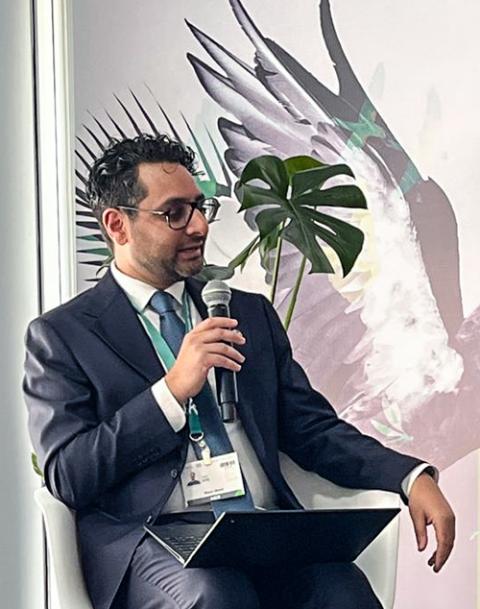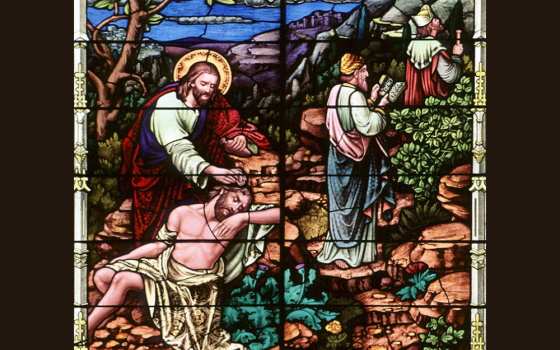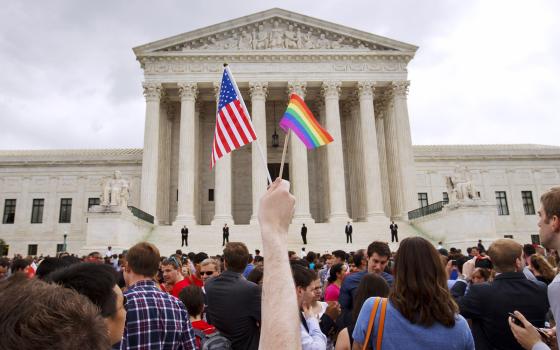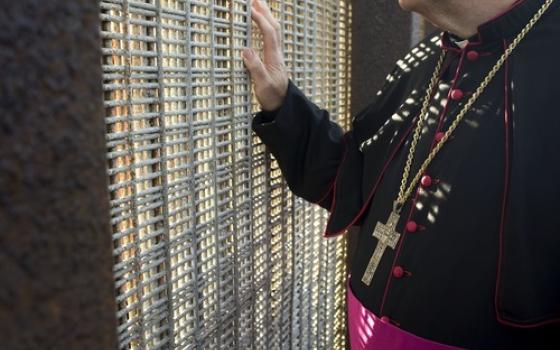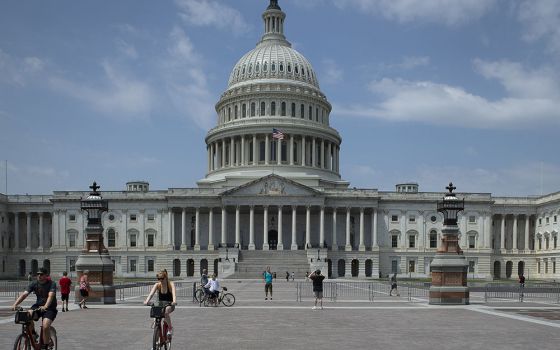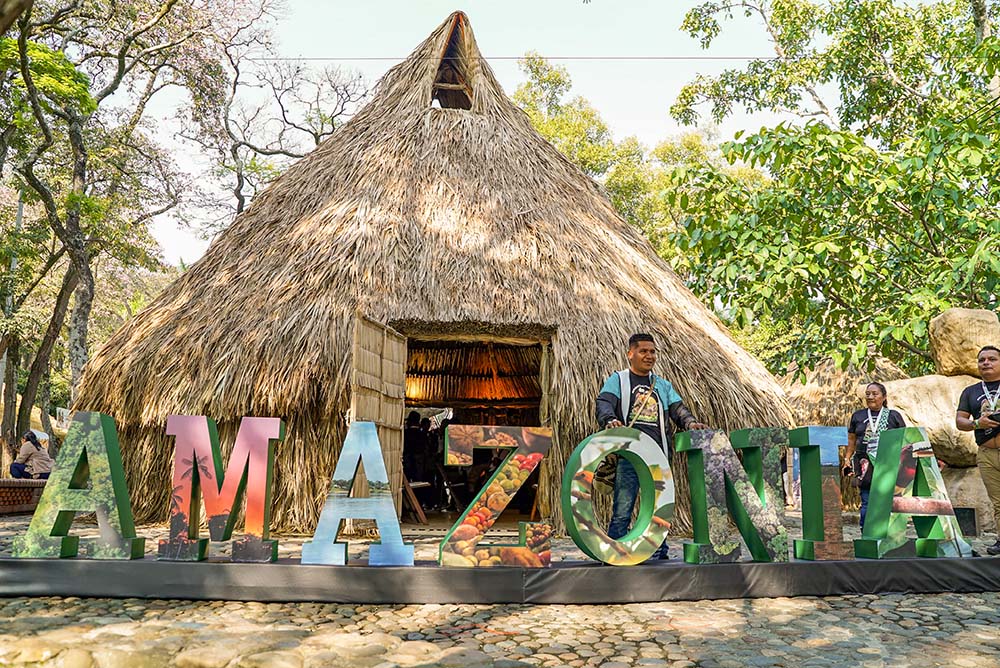
A scene from the "green zone" at the COP16 United Nations biodiversity summit. More than 23,000 people registered to attend the international conference held in Cali, Colombia, one of the world's most biodiverse countries. (Flickr/UN Biodiversity)
The United Nations biodiversity summit concluded in early November, with faith groups applauding its establishment of a permanent body for Indigenous peoples in conservation matters.
The 12-day international gathering, known as COP16 and held in Cali, Colombia, made some progress, but ended without decisions in key areas around funding and implementing the global conservation accord achieved two years earlier. Negotiations trailed into early morning Nov. 2 and abruptly concluded after some delegates departed to catch flights, leaving the body short of a quorum.
Dubbed the "Paris Agreement for nature," the Kunming-Montreal Global Biodiversity Framework, or GBF, was adopted in 2022, and holds nearly every nation — all but the United States and the Holy See — to 23 targets aimed at halting and reversing the rapid depletion of biodiversity around the globe and the threat of extinction facing more than 1 million species. A primary target has countries setting aside 30% of lands and waters for conservation by 2030.
Nations were expected to arrive in Cali with new national biodiversity action plans aligned with the GBF targets. Only 44 did, while nearly 120 established new national targets. Some countries said they lacked the time or resources needed to compile action plans in the time since COP15 in Montreal.
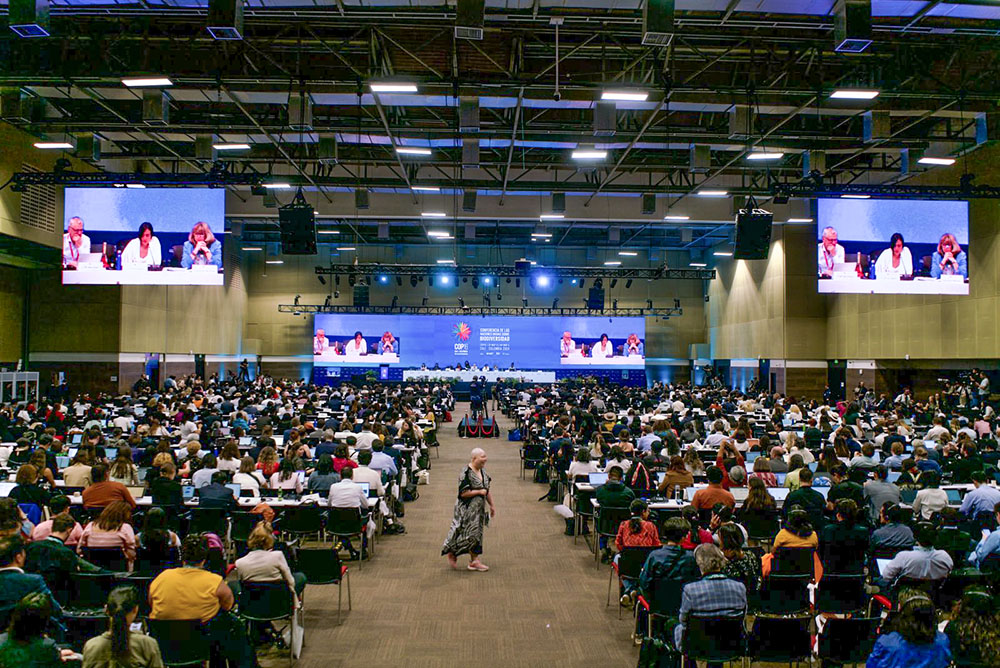
The United Nations biodiversity summit, known as COP16, concludes in the early hours of Nov. 2, in Cali, Colombia. Nations gathered to work on implementing the Kunming-Montreal Global Biodiversity Framework, aka "the Paris Agreement for nature," which includes a goal of conserving 30% of lands and waters by 2030. (Flickr/UN Biodiversity)
For the Faiths for Biodiversity coalition, which led faith engagement at COP16, a central achievement was the establishment of a permanent subsidiary body for Indigenous peoples, giving them for the first time in global biodiversity talks a direct voice in proceedings. Nations also agreed to new funding to support Indigenous peoples and local communities, and gave specific recognition of conservation contributions from Afro-descendent peoples.
Jocabed Reina Solano Miselis, director of Memoria Indígena, a collective of Indigenous Christians across the American subcontinent, called the new body a long-sought recognition of the value of traditional knowledge in conservation efforts, whose communities often face the threats from deforestation and extractive industries alongside the ecosystems where they reside.
"Terricide not only kills the Earth, but also kills the cultures, traditions, and dreams of those who have lived in harmony with it for millennia," Solano, a member of the World Council of Churches, said in a statement.
Damiana Lanusse, advocacy coordinator for Caritas Latin America, told EarthBeat the move "provides a foundation to protect and strengthen these communities whose traditional knowledge is invaluable to the biodiversity preservation."
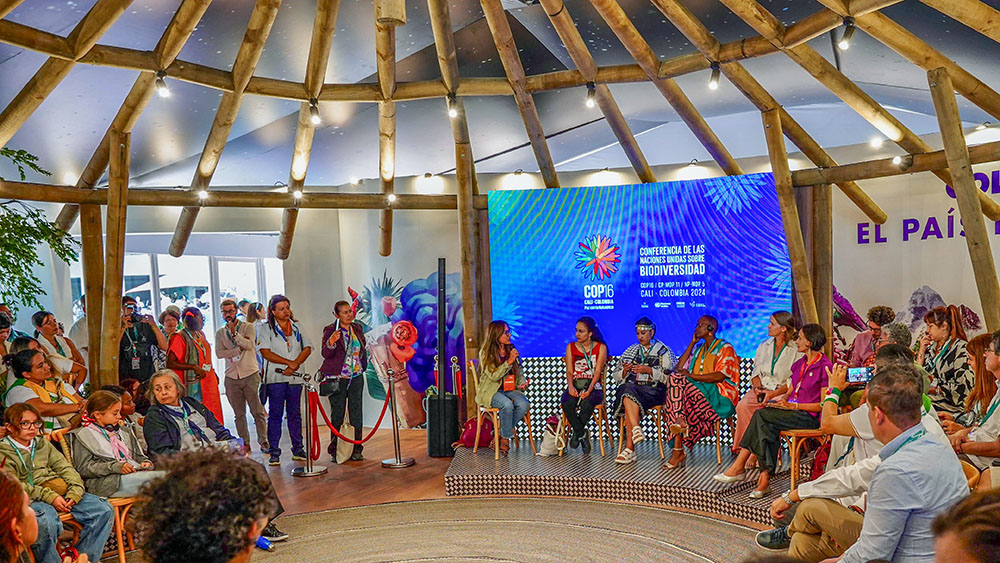
A panel discusses justice for environmental defenders at the COP16 U.N. biodiversity summit Oct. 23, in Cali, Colombia. One of the main outcomes of the conference was the establishment of a permanent advisory body for Indigenous peoples on conservation. (Flickr/UN Biodiversity)
Defending land protectors and ensuring Indigenous groups have a voice in conservation were main priorities at COP16 for the Maryknoll Sisters, especially in Latin America — a part of the world rich in biodiversity but also a hotspot for extractive industries and attacks on those protecting nature. Global Witness reported that 196 environmental defenders were murdered in 2023, the vast majority occurring in Latin America; Colombia led with 79 murders.
"We feel our biggest role is to stand up, make it clear as the church, as defenders of human rights that it has to be a priority, to defend those who are defending the land," said Lisa Sullivan, integral ecology senior program officer with Maryknoll Office for Global Concerns.
The Faiths for Biodiversity Coalition also welcomed the adoption of procedures to identify ecologically or biologically significant marine areas for protections; an agreement on sharing digital genetic information; and recognition by countries of the need to align their plans for addressing biodiversity loss and climate change.
But the faith coalition expressed serious concerns about nations' ambition to stem the tide on biodiversity.
Nations yet to submit new biodiversity plans are urged to do so "as soon as possible." Next year, they're expected to finalize a monitoring mechanism and to establish a new biodiversity fund. Countries have set a goal of mobilizing $200 billion annually by 2030 — with $20 billion from developed countries by next year — and in the same time, redirecting $500 billion in subsidies harming biodiversity. So far, about $400 million has been pledged.
"Without funding and accountability, the situation won't change, and pollution and degradation of lands will continue," said Maryknoll Sr. Dee Smith.
The Faiths for Biodiversity coalition also raised concerns with the lack of language in the final document on respecting and upholding human rights, which they called essential for sustainable environmental outcomes.
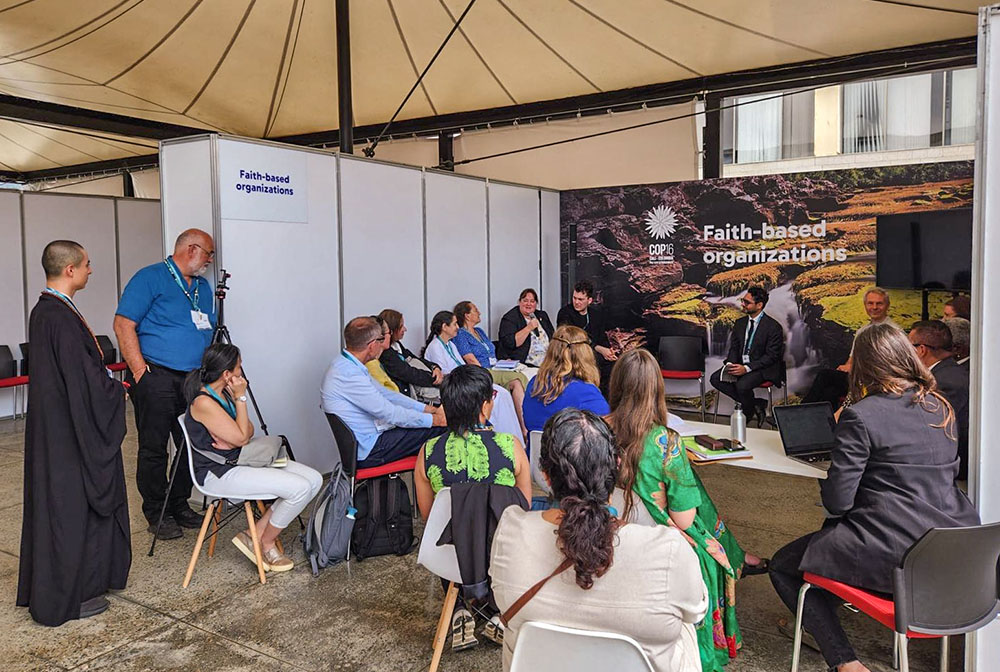
For the second time, faith groups hosted a "faith hub" at a United Nations biodiversity summit. More than 60 representatives of religious and spiritual organizations were present at COP16 in Cali, Colombia. (Wesley Cocozello)
A large Indigenous presence from the Amazon and other parts of Latin America were present in Cali, a city situated in a country home to 10% of the world's biodiversity.
Twenty countries joined host nation Colombia in a "peace with nature" pact, reflecting the conference's theme.
For the second time at a U.N. biodiversity summit, the faith community hosted a hub, which staged more than 30 events. Upward of 60 faith leaders were in attendance, including a sizable Catholic presence. Among them: Espinal Bishop Juan Carlos Barreto, president of Caritas Colombia; Cali Archbishop Luis Fernando Rodríguez; representatives of the Pan-Amazonian Ecclesial Network (REPAM); and Archbishop Paolo Rudelli, representing the Holy See as apostolic nuncio to Colombia.
Across the two weeks, the Faiths for Biodiversity coalition aimed to demonstrate the work that religious organizations are already doing to implement the Global Biodiversity Framework — including through a new report — and to seek out collaboration with other constituencies around conservation.
Gopal Patel, co-coordinator of Faiths for Biodiversity, said there was "increased/ing recognition" from the U.N. and other entities of the importance of the faith voice in biodiversity conservation work.
"The main message is that we're doing it, will continue doing it, we want to do more, and we want to do more in partnership with as many other people and organizations as possible," he said.
During an Oct. 23 meeting with faith leaders, Astrid Schomaker, executive secretary of the U.N. Convention on Biological Diversity, said that "the voice of faith is as important as the voice of science" in biodiversity conservation.
Schomaker suggested faith can help communicate and educate about the need to preserve nature "for the sake of all of us living and sharing this planet with many other creatures and for future generations."
Patel said the executive secretary's putting faith and science on par with each other "reflects that so many people of the world engage in this work through a faith-, values-led perspective, and that we seem to have lost that over a number of years."
For the Maryknoll Sisters, who had four representatives in Cali, it was important to attend because much of their work connects to biodiversity, Sullivan said. They minister in communities in Latin America and Africa that not only deal with the impacts of land degradation and biodiversity loss but are also actively working on solutions to curb and reverse it.
In Panama, for instance, Maryknoll Sisters have helped revert 50 hectares (124 acres) of land back to rainforest that doubles as a teaching eco-farm. In northern Guatemala, Smith runs an HIV clinic and hospice facility on an organic farm.
Advertisement
The Catholic Church of Latin America hosted more than 30 events during COP16. That included presentations on the "Laudate Deum Route," a plan named after Pope Francis' 2023 apostolic exhortation "on the climate crisis" that outlines commitments of the Latin American church to biodiversity and environmental care.
A number of Catholics in Cali expressed disappointment that the Holy See, as well as the U.S., has not ratified the U.N. Convention on Biological Diversity, under which the Kunming-Montreal Global Biodiversity Framework was adopted. The election of Donald Trump to a second term makes entry by the U.S. unlikely in the near future.
"If the Holy See and the USA have not ratified it, then the world's moving on without them. And that's the sad part, because they do have a lot to contribute," Smith said.
The next biodiversity summit will take place in Armenia in 2026.
For the faith coalition to advance its work, Patel said it needed to become more versed at speaking "the language of science" and of negotiators, which will allow it to be more effective bridge-builders as the executive secretary suggested.
"I think that's part of the challenge and the opportunity for the faith groups," he said.

